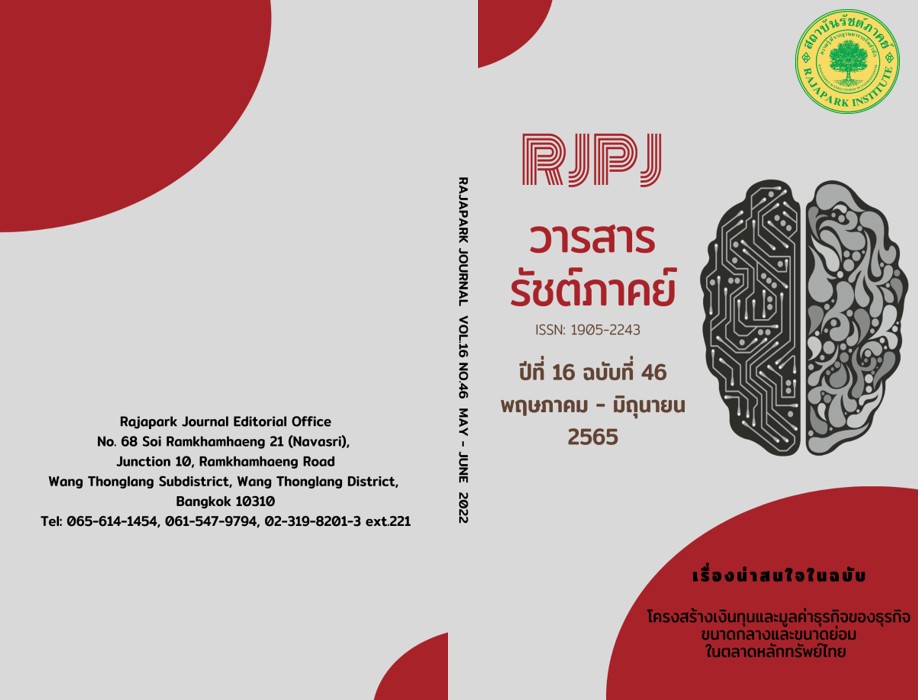รูปแบบการบริหารจัดการเรียนรู้ดนตรีสากลในศตวรรษที่ 21 ของโรงเรียนมัธยมศึกษาสังกัดกรุงเทพมหานคร
Main Article Content
บทคัดย่อ
การวิจัยนี้มีวัตถุประสงค์ 1) เพื่อศึกษาสภาพและแนวทาง 2) เพื่อสร้างรูปแบบ 3) เพื่อประเมินประสิทธิภาพ 4) เพื่อทดลองใช้รูปแบบการบริหารจัดการเรียนรู้ดนตรีสากลในศตวรรษที่ 21 ของโรงเรียนมัธยมศึกษา สังกัดกรุงเทพมหานคร โดยดำเนินการวิจัย 4 ขั้นตอน ดังนี้ (1) ศึกษาสภาพและแนวทาง เก็บข้อมูลจากผู้อำนวยการและครู 86 คน สัมภาษณ์ ผู้เชี่ยวชาญด้านการสอนดนตรี 5 คน ผู้อำนวยการ 2 คน และครู 2 คน รวม 9 คน (2) พัฒนารูปแบบและตรวจสอบความถูกต้องเหมาะสมโดยผู้เชี่ยวชาญ ใช้การสัมภาษณ์เชิงลึก คือ ผู้อำนวยการ ผู้เชี่ยวชาญทางด้านดนตรี และอาจารย์มหาวิทยาลัย 5 คน (3) ประเมินรูปแบบด้านการประเมินความเป็นไปได้และความเป็นประโยชน์ โดยผู้อำนวยการ และครูผู้สอนกลุ่มสาระการเรียนรู้ศิลปะ(ดนตรี) 30 คน (4) นำรูปแบบไปทดลองใช้ และประเมินผลการใช้ตามแผน จากผู้บริหาร ครู ในโรงเรียนที่นำรูปแบบฯ ไปใช้ เครื่องมือที่ใช้คือ แบบสอบถาม แบบสัมภาษณ์ และแบบประเมิน วิเคราะห์ข้อมูลเชิงคุณภาพใช้การวิเคราะห์เชิงเนื้อหา สถิติที่ใช้คือ ร้อยละ ค่าเฉลี่ย และส่วนเบี่ยงเบนมาตรฐาน ผลการวิจัยพบว่า รูปแบบการบริหารจัดการเรียนรู้ มี 2 องค์ประกอบ คือ (1) การบริหารจัดการ มี 7 ด้าน คือ ด้านหลักสูตร ด้านการบริหารจัดการ ด้านกิจกรรมการเรียนการสอน ด้านผู้สอน ด้านผู้เรียน ด้านสื่อและอุปกรณ์ และด้านการวัดและการประเมิน (2) กระบวนการการบริหาร 4 ขั้นตอน คือ การวางแผน การจัดองค์กร การนำ และการควบคุมองค์กร การปฏิบัติงานเป็นตัวขับเคลื่อนการดำเนินงาน ผลการประเมินความเหมาะสมและความเป็นไปได้ พบว่า มีความเหมาะสมและความเป็นไปได้อยู่ในระดับมาก
Article Details

อนุญาตภายใต้เงื่อนไข Creative Commons Attribution-NonCommercial-NoDerivatives 4.0 International License.
ทัศนะและความคิดเห็นที่ปรากฏในวารสาร ถือเป็นความรับผิดชอบของผู้เขียนบทความนั้น และไม่ถือเป็นทัศนะและความรับผิดชอบของกองบรรณาธิการ
เอกสารอ้างอิง
Anannawee, P. (2014). Principles, Theories of Educational Administration (4th ed.). Montree.
Chatmaneerungcharoen, S., & Thongnoppakhun, W. (n.d.). 21st Century Skills: Future Challenges Ahead. Faculty of Education, Phuket Rajabhat University. https://issuu.com/phubatelouimsai/docs/21
Daft, R.I. (1994). Management. The Dryden.
Daft, R.L. (2006). The New Era of Management: International Edition. South-Western Thomson.
Education Council Secretariat, Ministry of Education. (2009). Second Decade of Education Reform Recommendations (2009-2018). Phrikwan Graphic.
Keeves, P. J. (1988). Educational Research, Methodology, and Measurement: An International Handbook. Pergamon Press.
Lemke, C. (2010). Innovation Through Technology. In J. Bellanca and R. Brandt (Eds.), 21st Century Skills: Rethinking How Students Learn, (242-272). Solution Tree Press.
Luo, X., (2019). Chinese Language Learning Management Model for Bilingual Schools (Thai-Chinese) under the Bangkok Metropolitan Administration[Doctoral Dissertation, North Bangkok University].
Ministry of Education. (2008). Basic Education Core Curriculum 2008. Agricultural Cooperative Federation of Thailand.
Naweekarn, S. (2002). Participatory Management. Bannakij.
Oblinger, D. (2010). A Commitment to Learning: Attention, Engagement, and the Next Generation. EDUCAUSE Review, 45(5), 4-6.
Office of the National Economic and Social Development Board. (2017). The Twelfth National Economic and Social Development Plan (2017-2021). Office of the National Economic and Social Development Board.
Poomin, P. (2004). International Music. Fine Arts Journal Faculty of Fine and Applied Arts Srinakarinwirot University, 12(2).
Sanguannam, C. (2008). Theory and Practice in School Administration (2nd ed.). Book point.
Sergiovanni, T. J., & Burlingame, M. (1992). Educational Governance and Administration (3rd ed.) Allyn and Bacon.
Simon, H.A. (1976). Administrative Behavior. Free Press.
Sirisawat, P. (2013). A Study on Music Learning Desire of Students in Private Music School at Suanluang District, Bangkok[Master’s Thesis, Bansomdejchaopraya Rajabhat University].
The Teachers' Council of Thailand (Khurusapha). (2015). The Professional Standards and Professional Ethics. The Teachers' Council of Thailand (Khurusapha).
Uttarapong, T. (2008). Classical Guitar Performance Case Study Music Program, Bachelor of Arts, Thaksin University[Master’s thesis, Mahidol University].


